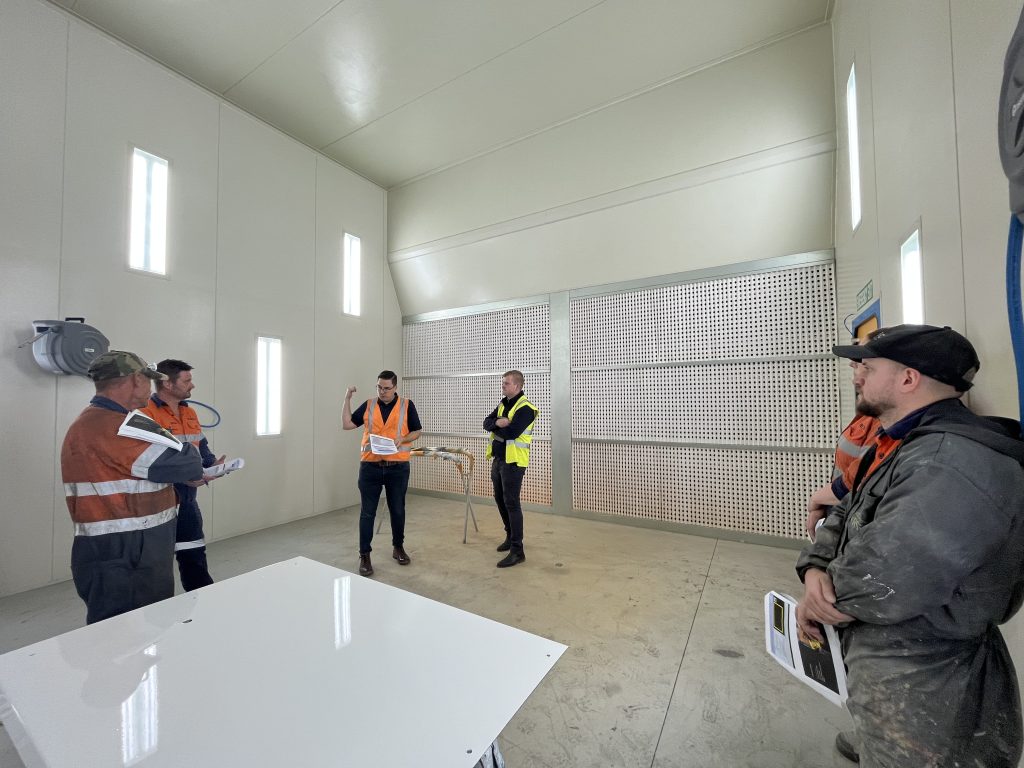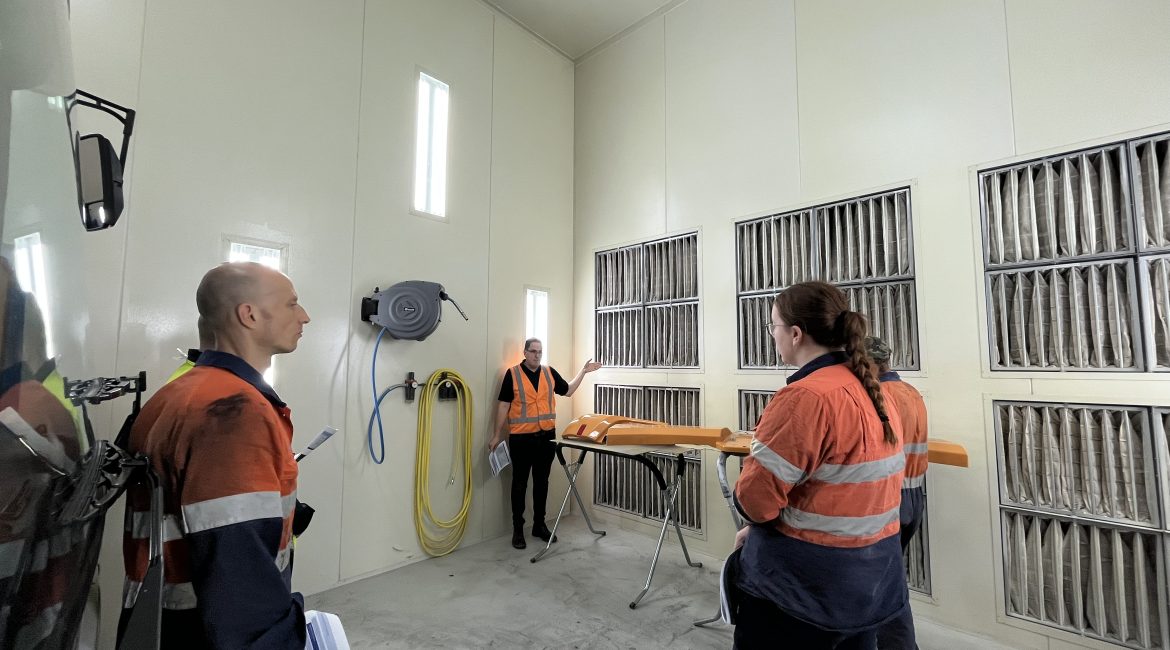Welcome back to Spray Smart, TruFlow’s FAQ series built around the real questions businesses are asking.
Choosing the right spray booth is a critical investment and staying compliant is just as important as the spray booth itself. That’s why, in this article, we’re covering one of the most important topic every paint shop owner needs to know, spray booth certification:
What certifications are required for spray booths in Australia?
From national safety standards to environmental regulations and local council approvals, there are several compliance steps you need to follow to ensure your spray booth is certified, safe and legal to operate. In this guide, we break down everything you need to know.
Certifications and Compliance Overview
To legally install and operate a spray booth in Australia, your system must meet multiple layers of regulation:
- Compliance with AS/NZS 4114:2020 and related standards
- Spray Booth Certification by licensed professionals
- WHS safety requirements
- Environmental regulations (EPA)
- Local Council permits
- Ongoing audits and maintenance
Let’s take a closer look at each.
Core Spray Booth Certification: AS/NZS 4114:2020
The benchmark for spray booth compliance in Australia is AS/NZS 4114:2020 the national standard covering design, installation, testing and maintenance of spray booths, mixing rooms and designated spray painting areas.
Key requirements:
- Ventilation:
- Downdraft booths: minimum 0.25 m/s vertical airflow (empty booth)
- Crossdraft & semi-downdraft: minimum 0.5 m/s horizontal airflow
- Filtration:
- Exhaust filtration systems must effectively capture VOCs, paint aerosols, and hazardous particles such as isocyanates and chromates.
- Safety Controls:
- Airflow sensors, interlocks, over-temperature protection and electrical systems must comply with AS/NZS 60079 standards for explosive atmospheres.
- Certification:
- Booths must be installed and commissioned by licensed technicians.
- A Certificate of Compliance (CoC) is issued by a qualified third-party inspector after installation and must be displayed at the control panel.
Spray Booth Certification Supporting Standards
AS/NZS 1715:2009: Covers the selection, use and maintenance of respiratory protective equipment, especially important for isocyanate-heavy paints.
AS/NZS 60079 Series: Governs electrical equipment and safety in hazardous areas, classifying zones and protection methods within spray booth environments.
These certifications often require documentation prepared by licensed hazardous area engineers as part of your compliance dossier.
What Should Be in Your Spray Booth Certification Dossier?
This documentation should be kept on-site and updated for the life of your spray booth:
- Certificate of Compliance (AS/NZS 4114:2020)
- Electrical Certificate of Safety
- Gas commissioning report (Type B)
- Hazardous Area (HA) delineation certificate
- Third-party audit reports
- Maintenance logs and inspection schedules
WHS & Safe Work Compliance
As an employer, you are legally responsible under the Occupational Health and Safety Act 2004 and the Occupational Health and Safety Regulations 2017 to ensure a safe work environment.
Refer to the Safe Work Australia Model Code of Practice: Spray Painting and Powder Coating (2020), which outlines:
- Proper ventilation to prevent accumulation of harmful fumes
- PPE supply and usage, compliant with AS/NZS 1715
- Regular health monitoring (eg. lung function tests)
- Record keeping for inspection, maintenance and incidents
Environmental Protection (EPA Compliance)
Spray booths must limit their environmental footprint, especially when it comes to VOC emissions, filtration and waste management.
Requirements include:
- Use of high-efficiency filtration systems
- Proper exhaust discharge control
- Safe disposal of hazardous waste
Important: Local EPA branches and councils may impose additional requirements (e.g. noise limits, plume dispersion zones). Early consultation is key.
Example: TruFlow’s AUS-319 three-stage filtration system exceeds baseline EPA standards and is recommended for toxic paint applications such as aviation or defence coatings.
Local Council Planning Approvals
Before installation, you must seek planning permission from your local council. This often includes:
- Spray booth layout plans
- Environmental impact reports
- Noise and fume mitigation strategies
- Proof of standards compliance (e.g. 4114:2020)
Permit requirements differ between jurisdictions, so engage your local authority early.
Ongoing Compliance & Maintenance
Spray booth certification doesn’t stop after install.
You’ll need:
- Regular inspections of airflow performance, filter condition and ventilation
- Burner testing to check CO/CO2 emissions
- Respiratory air quality testing (per AS/NZS 1715)
- Maintenance logs kept in the compliance dossier
Tip: Partner with certified technicians (eg. TruFlow Maintenance Services) to ensure accurate records and hassle-free audits.
Industry-Specific Notes
Aviation & Defence
Tighter environmental and safety standards apply. Many paints contain chromium or cadmium, requiring:
- Triple-stage filtration (99.9% capture of particles)
- Hazardous substance mitigation documentation
- HA classification reporting
Summary: Spray Booth Certification Checklist
To operate a spray booth in Australia, you need:
- Certificate of Compliance (AS/NZS 4114:2020)
- Gas & Electrical Safety Certifications
- Hazardous Area Certification (AS/NZS 60079)
- Respiratory Compliance (AS/NZS 1715:2009)
- EPA Environmental Compliance
- Local Council Planning Permit
- Ongoing Maintenance & Audit Records
Final Recommendations
- Only use licensed installers and certified equipment
- Confirm all certification documents are supplied post-installation
- Engage a qualified third-party inspector for your CoC
- Invest in high-efficiency filters, especially for toxic or high-output operations
- Stay audit-ready with a well-maintained documentation file
- Speak with TruFlow’s engineering team to guide your compliance process
By staying informed and proactive, you can ensure your spray booth is safe, efficient and fully certified giving your business the confidence to spray smart.
Need help with your certification? Contact TruFlow and ask to speak with a senior engineer about your compliance needs.







